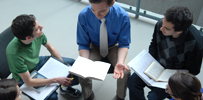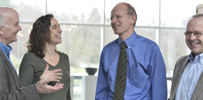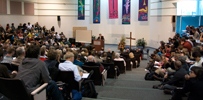Can Science Show Us the Good?
This event has now ended. Please view this page to see all our upcoming events.
_Full_(1).png?1705089815)
About the Event
In this lecture, philosopher Paul Nedelisky (Institute for Advanced Studies in Culture, University of Virginia) will survey the history of attempts to find a scientific basis for morality—and explain why such attempts to root the Good in science have failed. When understood and deployed rightly, however, science can be a useful tool in the perennial quest to understand morality and ethics. Nedelisky will delineate this right use of science in moral imagination during the second part of his lecture.
David Robinson, Regent's R. Paul Stevens Assistant Professor of Marketplace Theology and Leadership, will provide a response.
This lecture will be offered onsite in the Regent College Chapel, and will be available via livestream and recording at rgnt.net/live.
About the Speaker
Paul Nedelisky is Assistant Director and a Fellow at the Institute for Advanced Studies in Culture. He is also coauthor, with James Davison Hunter, of Science and the Good: The Tragic Quest for the Foundations of Morality (Yale University Press, 2018).
Nedelisky’s research interests center on issues in metaphysics and ethics. His work in metaphysics concerns the nature of the fundamental constituents of reality—the basic building blocks of the world. He has won several teaching awards, including being named an honoree of the Seven Society’s Graduate Fellowship for Superb Teaching.
Nedelisky received a PhD in Philosophy from the University of Virginia in 2013.
About the Respondent
David Robinson teaches Marketplace Theology and directs the Master of Arts in Leadership, Theology, and Society (MALTS). His current research focuses on the theological ethics of human work as well as approaches to sustainability (personal, corporate, and environmental). His previous research focused on modern philosophical and theological accounts of the self in society, including church-state relations. David is the author of Christ and Revelatory Community in Bonhoeffer’s Reception of Hegel. He has also published articles in Journal of Church and State, Modern Theology, Theology and Science, and Studies in Christian Ethics.
About the Houston Centre
The Houston Centre for Humanity and the Common Good is a five-year initiative of Regent College, grounded in Dr. James M. Houston’s comprehensive vision of integrative scholarship. Its main task is to foster interdisciplinary and interreligious dialogue on the central question of the late-modern world: what does it mean to be human?
Inviting a range of philosophical perspectives through collaboration with the University of British Columbia and other institutions, the Centre explores a holistic understanding of humanity that accounts for the unique social, political, and theological issues of our time. Comprising a community of leading scholars, the Centre generates dialogue across disciplines—theology, philosophy, biology, cognitive science, political studies, and more—in order to navigate the mystery of the human person.
Through public lectures, seminars, and a variety of publications, the Houston Centre helps others engage theological questions of humanity for the common good.
Questions? Get in touch with the Houston Centre team at [email protected].
Location
Regent College Chapel (5800 University Blvd, Vancouver, BC)
Parking
Paid parking available at Regent College and UBC






